In September 1999, Aaron Persico planned to join the police. He was labouring on building sites, playing club rugby in Wellington and pushing hard for New Zealand age-grade honours. He was happy with his lot. A career in law enforcement felt like his calling.
Persico’s Italian grandfather, Liberato, had always encouraged him to broaden his horizons and travel to Europe, while chiding the boy he’d never be good enough to play for the motherland.
Five months later, Persico stood drenched in sweat inside a cacophonous Stadio Flaminio, a heavy cotton jersey on his back, Russell Crowe in the stands, and rugby people collectively losing their minds around him.
At 21 years old and with barely a word of Italian, he could never have imagined the part he’d play in Six Nations history. How he’d etch his name into championship folklore in his first Test for a country he’d never visited. How Italy, after years of lobbying, announced their arrival at the big dance by felling Scotland, the last Five Nations winners, in their deafening Roman cathedral.
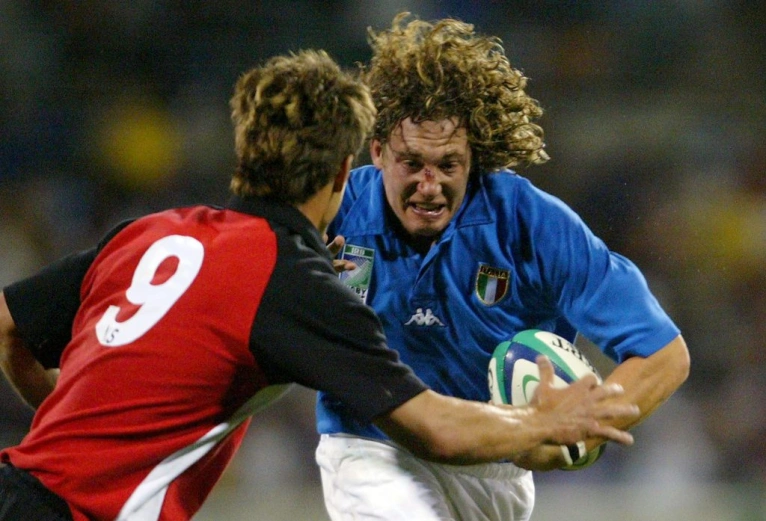
“I had my police interview and was told to go overseas, get some life experience and come back when I was ready,” Persico says. “How was I going to get overseas? I reached out to an agent, who asked about my Italian heritage, and said Italy had a guy travelling around New Zealand looking for eligible players. Long story short, I finished up my club season and moved over.”
Persico set up at Viadana, a prominent Italian club near Parma in the north of the country where rugby is most popular. Viadana had just won promotion to the top flight and played attractive rugby. With his all-action style, Persico soon felt at home.
The Italian game was reeling from a bleak 1999 World Cup. Self-esteem plummeted and anxiety pervaded the coming Six Nations launch. Humiliation was a very real fear. Brad Johnstone, a fellow Kiwi, was appointed coach and decided hungry tearaways like Persico were worth a look.
“His philosophy was training harder than the game so the games would be easy,” Persico says, recalling his first day in the 50-strong Italian training squad.
“I turned around and the body language of the Italian boys wasn’t too inviting so I really took that on as an opportunity. I wanted training to be the toughest it could be. Every session was an opportunity for me to get involved and put my name out to the coaches.
They’d been professional for a long time. I had been working on construction sites.
“I didn’t know any of the players, or who I was fighting with to play flanker, but I did know the players who had been in professional environments in England and France were definitely a lot stronger. They’d been professional for a long time. I had been working on construction sites. I just had to throw everything at it.”
Another burgeoning upstart was there that day. Twenty-year-old Mauro Bergamasco was already a full international when the Six Nations rolled around. He was earmarked as a versatile hotshot when Johnstone hoisted him up from the age-grade side on a permanent basis.
“I was playing 10 for Petrarca, and I was playing centre for the Italian Under-21s. When Brad Johnstone came to work with the U21s, I trained at flanker because the coaches knew he wanted to watch me playing there.
“When I got the call for the Six Nations squad I thought, okay, I don’t know if I am ready. I can remember the first call came one month before the squad met up, and I used that time to train three sessions a day, just to try to be ready to play with them. I had a chance; I had to take it.”
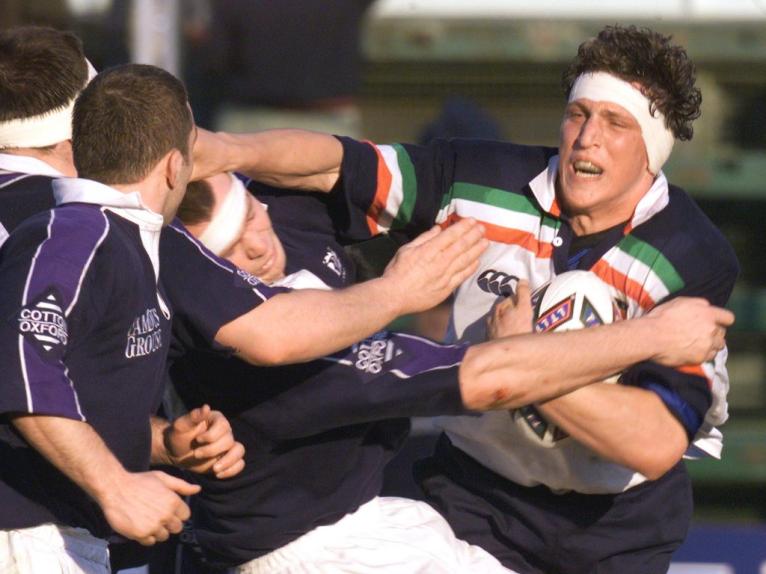
Bergamasco had been raised in a rugby family, but the game commanded little presence on the national news cycle. He felt the aura of his new team-mates without knowing all their feats.
“There was no Instagram or social media. You read about them in the newspaper, you could watch some games on TV, but not all the information you have today. You don’t know their faces or their lives, you couldn’t recognise them on the street. More than half the team, I didn’t know. I knew their names but not their faces. But I could feel it was a team of champions. They accepted me, gave me the chance to prove I wanted to be part of the team.”
Everybody had something to prove that year. Persico, winning his first cap from the bench. Bergamasco, his second in the No 7 shirt. The old timers – Alessandro Troncon, Diego Dominguez, and the late, beloved Massimo Cuttitta – realising the Six Nations dream they had spent years fighting to attain. “Everybody expected us to be useless,” Johnstone later said. Italy yearned to show they belonged in this rarefied air.
“They’d had a disastrous 1999 World Cup and everybody wrote them off,” Persico remembers. “Journalists and supporters said they didn’t deserve to be in the Six Nations.
“We were happy with the draw, playing Scotland at home first. Rome is a great city for that passion – it’s February, still warm, so much history behind it all. The boys play like men possessed knowing they want to prove everybody wrong. We wanted to show we deserved to be there and were a good rugby nation. I just didn’t want to come off the bench and stuff something up.”
Troncon was diving around, throwing himself on the ground – ‘this what we have to do!’ He was like a complete nutter.
On game day, Persico ran into an old friend from New Zealand. Martin and John Leslie had played for his former club in Wellington before becoming integral parts of Scotland’s 1999 title winners.
“I spoke to Martin during the warm-up. I knew him pretty well. He said, ‘mate, to make sure you know, you’re taking us out afterwards’. I was going, ‘f**k, I’ve never been to Rome. Now I’ve got the pressure of taking the Scottish boys out’.
“It was cool to see him which gave me a bit of relief and confidence I knew somebody who had been overseas and been successful.”
He remembers Troncon, an Italian kingpin and captain, leaping around the changing room like a scalded cat. A thumb through Italy’s iconic newspaper, Gazzetto dello Sport, that morning would provide new fans with a whistlestop guide to rugby laws. To layer on the trippiness, rugby league disciple Crowe sat in the Stadio Flaminio tribune as he took a break from filming Gladiator.
“The boys were very tense, but up for it,” Persico says. “The players who played in France or England stood up and took responsibility. Troncon was diving around, throwing himself on the ground – ‘this what we have to do!’ He was like a complete nutter.
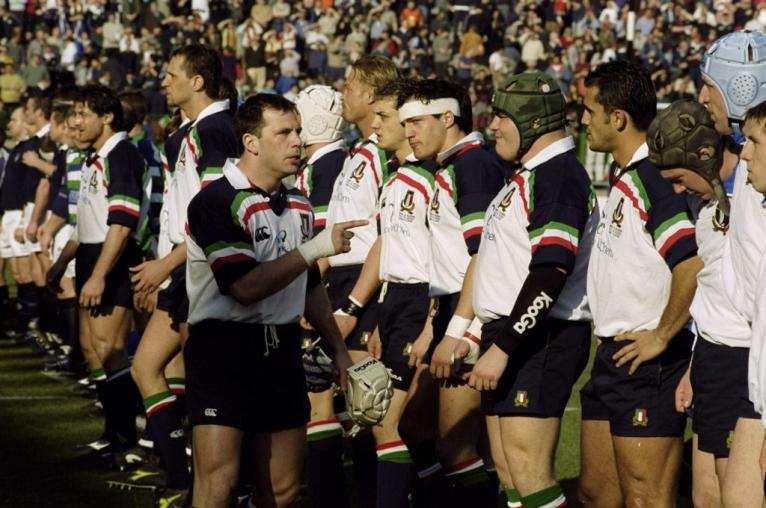
“Carlo Checchinato came in and said, ‘relax, we’ve got this, we’re going to beat them in every facet of the game.’ The boys just wanted to rip into it.”
Persico actually replaced Bergamasco for the final quarter, one wide-eyed tyro tagging in for the other. Italy were well ahead by then, a lead built on their Trojan-like defence and the flawless kicking of Dominguez. The fly-half, hailed as a ‘smiling assassin’ by the transcendent commentator Bill McLaren, was in the winter of his career. He wasn’t about to let this crowning day pass meekly by. The final score read 34-20 and Dominguez was responsible for 29 of the home points.
“I called Diego Dominguez a machine,” Bergamasco says. “He’d stay 30 minutes to kick after every training session. If we had a game on Saturday, on Sunday he would be kicking. With Alessandro Troncon, he was really able to drive a team which was, on paper, poorer than the opposition.
“Diego was a gift. I was really linked with him because he played 10 and I was seven, I supported him and he helped to balance my game and the game he wanted to create. I played with him for Italy, for Stade Francais, his last game for Italy and his last game for Stade. There are not a lot of players like him. Anything he did, he had to win. Competitive. His nature is really empowering for every player around him.”
Troncon gave us these small rectangle boxes. Wow, I wonder what this is. I got to my seat, opened it and it was a fridge magnet of the Colosseum.
Persico shared a room with Dominguez later that championship as Italy prepared to play France. With his curled locks and sense of derring-do, the wizened conductor was a rock star in Paris, where he’d won titles at Stade Francais.
“He had a lot of business stuff going on back in the day. All these boxes, merchandise, sponsors’ stuff would arrive at our hotel room, he could speak four languages, and he essentially had his own programme because he was doing all his extras, all his promo stuff. It was amazing to see how much respect the public had for him in France.
“He weighed 78kg but he was in amongst it with all the forwards, throwing his body around, tackling everybody, just the ultra-competitor. He was the first one to training, last one to leave. He brought me along just to pick up his balls at the kicking sessions.
“He had a pretty good relationship with the president of the federation which was very important. He was part of the leadership group and had so much wisdom.”
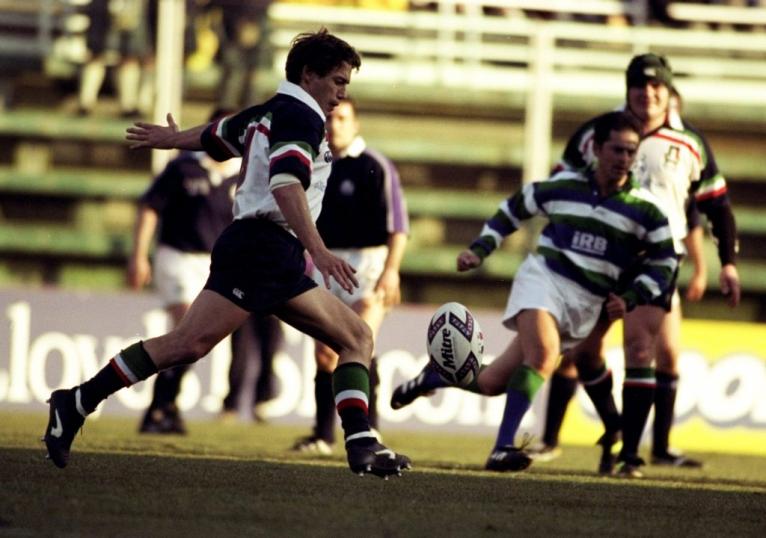
Nothing could prepare the new boys for the eruption of joy which struck them at full-time. Neither quite appreciated what they had achieved. They were too green; too raw.
“Maybe I couldn’t understand what the Six Nations meant,” Bergamasco reflects. “The players I played with were really the heroes who put Italy in the Six Nations. They fought a war for years to put us there.
“I remember the final whistle, my team-mates were crying, I saw the Scottish players with their eyes on the ground. In that moment, I really couldn’t understand. Yeah, we’d won a game, but what was happening? After 10 minutes, a few hugs with my team-mates, I understood – f**k, we are in the Six Nations, and we won our first match. No one could believe that would happen. It was a magical day.”
There followed one hell of a party. Details here are understandably – or deliberately – sketchy but one bit of the post-match dinner, Persico will never forget. It’s part charm, part slapstick.
We were full of hope. We thought we would be able to do it again. And we crashed against the reality that the Six Nations is another thing.
“Our team manager was a volunteer who just did it through passion,” he says. “After we beat Scotland, we had a pretty cool function in a really nice scenic area, in the middle of the Spanish Steps.
“The Scottish captain, John Leslie, went up, announced their two debutants and they came and collected their caps. During that ceremony, I saw our manager go ‘aw f**!’ and he buggered off. Alessandro, our captain, stood up and spoke and I saw the manager come back and give him something to pass on to the new internationals.
“Myself and Marco Rivaro were called up, and he gave us these small rectangle boxes. Wow, I wonder what this is – is it something golden, is it money? I got to my seat, opened it and it was a fridge magnet of the Colosseum. That was the type of structure and systems Italian rugby had in place – no real history, a volunteer manager, the boys eating pasta several times a day. We didn’t have that professionalism.”
Italian belief was soon punctured. The gulf between their modest ecosystem and those of their new opponents was simply too great to bridge with any regularity. Bergamasco, who joined Dominguez at Stade Francais, grew irked by dated attitudes and intransigence.
“We were full of hope. We thought we would be able to do it again. And we crashed against the reality that the Six Nations is another thing.
“We lost a lot of games in those early years. Sometimes we didn’t understand how to change what was wrong. Why did we lose by 40 points? What did we need? What was missing? We worked really hard but we did not get the results. There were a few young players like me coming through, and we were really bound to the past. Maybe changes were not supported.”
Johnstone’s reign was short-lived; the Caledonian giant-slaying his only victory in a dozen matches before being dismissed after the 2002 Six Nations. A player revolt was widely reported. Johnstone later bemoaned the politicking, agendas and meagre talent pool at his disposal.
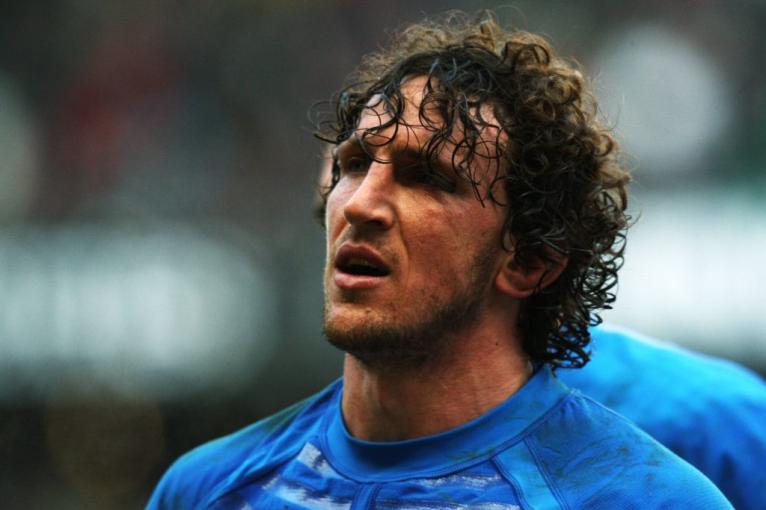
For a time, the Italian throne became more of a jump seat. Coaches came and went, false dawns were common, and their overall Six Nations trajectory never seemed to rise. In the next six seasons, Italy won two matches. They went seven years without victory between 2015 and 2022. They won in Rome for the first time since 2013 only in last season’s championship.
They suffered the constant questioning of their value to the tournament, save a beer-soaked weekend in the sun for travelling punters. They endured the interminable wait for a successor to Dominguez at 10; a backline to match the great, grizzled coal-shovellers up front; a supporting cast worthy of such generational totems as Bergamasco and Sergio Parisse, who often ploughed lone furrows in the Test arena.
Nobody is calling for the Italians to be booted out any longer. They delivered their best championship ever in 2024. Scotland flummoxed at the Olimpico; Wales flattened in Cardiff; a draw against France which would have been a victory but for a ball toppling from Paolo Garbisi’s kicking tee. At last, Italy have won credibility and respect as a force at Europe’s top table.
“It’s a really complete team,” Bergamasco says. “You can make many changes to the first XV and everyone is at a high level. We didn’t have that 25 or even 15 years ago.
“Every Six Nations is different from the others, and I really think that Italian team can do something special. Maybe special like last year; maybe more.”
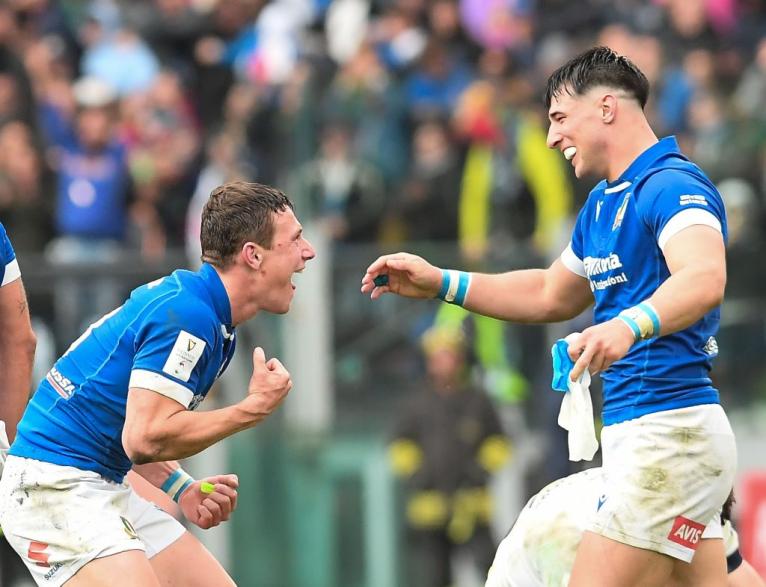
Bergamasco played over 100 times for Italy; usually at flanker, sometimes on the wing and once, memorably, at scrum-half. He and brother Mirco are giants of the Italian rugby scene, a profile founded alongside the Azzurri’s millennium trailblazers.
“That team was able to do something really, really special. I’m not talking about winning or losing, but creating something around the game – emotional relationships, even to understand what is wrong for you.”
Aaron Persico never joined the police. He won 56 caps, played for Leeds and Agen before ending his career with Rovigo. Today, he lives in Dubai, running the UAE branch of New Zealand’s Small Blacks youth rugby programme.
He still remembers the letters he sent back to his doting grandfather in Wellington, the connections he forged with his extended family in Sorrento. He visits Italy several times a year. And his precious fridge magnet from a quarter of a century ago has been replaced, belatedly, by a proper cap, issued some 15 years after his team stunned the rugby world.
“I see more people playing rugby in Italy, more people coming through the system and women’s programme. It’ll be cool to see what Italy can do next. Maybe put their hat in the ring to host a World Cup.
“For the past 10 years, everyone can see the value of Italy. They bring something different. People like going there. We’ve added some impact to that first game 25 years ago.”


Comments
Join free and tell us what you really think!
Sign up for free